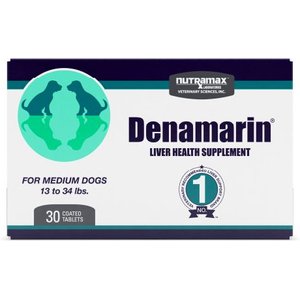When it comes to keeping our dogs healthy, we think a lot about heart health, joint health and skin health, but how much do we think about liver health for dogs? It might not seem like the liver is doing a lot, but liver function impacts most systems in the body, and even mild liver problems can cause a big fuss. One way of protecting your dog’s liver health is with liver support supplements.
Do Dogs Need Liver Supplements?
The liver is one of the largest organs in the body and performs a remarkable number of vital tasks for the body, such as:
- Acts as the primary filter for blood that comes from the digestive system
- Produces and secretes bile that is necessary for digestion
- Stores vitamins, minerals and provides energy in the form of glycogen and fat
- Removes toxins from the blood
- Metabolizes drugs
- Makes proteins that are involved in blood clotting and maintaining appropriate blood pressure
Many people know that dogs with impaired liver function benefit from a supplement that supports liver health, but even healthy dogs can benefit from a liver supplement under certain circumstances.
Throughout a dog’s life, the liver endures exposure to toxins, parasites, medications, infections and stress.
Additional factors, such as old age, genetics and diet, can also cause increased wear and tear on this important organ—and impair its ability to effectively detoxify the blood and make critical proteins.
Coupled with the fact that a pet’s liver absolutely must function optimally, there may be times when it’s a good idea to give your dog a liver-support supplement, at least intermittently.
When to Give Liver Supplements to Your Dog
Dogs who have liver disease may benefit from a liver support supplement, but not always. If your dog has been diagnosed with liver disease, they most likely have already been prescribed a liver supplement from your veterinarian. If not, check with your vet before giving your dog supplements. Other than liver disease, dogs who may benefit from liver supplements include:
- Dogs who are being fed a homemade diet
- Dogs with digestive issues
- Dogs who have recently been on certain medications or regularly take medication
- Senior dogs
Liver supplements can be an extraordinarily helpful tool for maintaining liver health in some dogs, but they aren’t necessary for all dogs. In some cases, they can actually be harmful to certain dogs with existing medical conditions. In addition, liver supplements may interfere with prescription medications.
For these reasons, always talk to your vet before starting liver supplements to make sure you are doing the best thing for your dog’s health.
What to Look for in Liver Supplements
If your veterinarian says it is safe to start giving your dog a liver-support supplement, you need to know the difference between helpful and hype. Here are the most common and effective ingredients to look for in a dog liver supplement:
Silymarin (Milk Thistle)
Silymarin, also called milk thistle extract, is a nutritional supplement used to treat a variety of liver conditions in many species, including dogs. Milk thistle is suspected to help the liver by inhibiting enzymes that damage liver cells, as well as provide anti-inflammatory and antioxidant effects. Silymarin is given by mouth and usually takes a few weeks to have a full effect.
S-adenosylmethionine (SAM-e)
SAM-e is created by the body from an essential amino acid called methionine. SAM-e for dogs is a commonly prescribed liver support supplement that mimics the SAM-e the body makes naturally. The body converts SAM-e into glutathione, which has detoxifying and antioxidant effects on the liver, thus protecting liver cells. Normally, a healthy liver will produce enough SAM-e on its own. But if the liver is damaged or debilitated due, lower than optimal levels of SAM-e occur. When this happens, SAM-e supplementation becomes beneficial to dogs with liver disease. SAM-E is given by mouth.
Omega-3 Fatty Acids
Omega-3 fatty acids EPA and DHA are healthy fats that are believed to reduce overall inflammation in the body, including inflammation in the liver. Omega-3 fatty acids are also thought to be good for kidney support, immune system health, joint support, brain health, and skin and coat health. Omega-3s from fish oil or krill oil are the best, and are available in liquid, capsules, dog treats and soft chews.
Glutathione
The liver makes glutathione, which is known as a master antioxidant. It plays a powerful role in reducing inflammation in the body by scavenging damaging free radicals. Glutathione levels decrease as a dog ages, however, which can predispose older dogs to disease associated with chronic inflammation. Supplementing with glutathione can help—however, oral supplementation doesn’t work. Instead, a topical gel can be rubbed into hairless areas. Glutathione can also be boosted by exercise and vitamin C powder supplements.
Zinc
Zinc is a trace mineral that is essential for normal growth of cells in the body, and dogs with liver disease are often deficient. Supplementing with zinc is a delicate balancing act, however, as too much zinc can be toxic. Most healthy dogs can get appropriate amounts of zinc from their dog food. Zinc also comes in tablets that are best absorbed when crushed and mixed with food. If you want to supplement your dog with zinc, talk to your veterinarian first.
Probiotics
Probiotics may not be considered a first-line liver support supplement, but they do support the digestive tract and the liver is part of the digestive tract. Healthy guts support healthy livers, and vice versa. Plus, probiotics are safe; they can benefit almost all dogs and provide immune support. Probiotics for dogs usually come in a chew, capsule or a powder that can be sprinkled on food.
Vitamin E
Vitamin E is a potent antioxidant thought to be beneficial to liver health and is also used as a preservative. In general, supplements that contain vitamin E in the natural form of D-alpha-tocopherol are considered superior to supplements with synthetic vitamin E. Vitamin E is available in capsule form.
In addition to ingredients, here are a few more tips to help you choose the best liver-support supplements:
- Purchase brands that have a third-party laboratory test the safety and efficacy of their products.
- Look for a lot number on the product label. This is a sign that the company likely uses strict quality-control procedures.
- Do not give human supplements to dogs, as they may contain ingredients or amounts of active ingredients that are harmful to dogs.
- Consult with your veterinarian, They will be your best resource on vetting supplements and will also carry high-quality supplements.
- Avoid supplements that focus on liver “detox”; this is mostly marketing hype.
Best Liver Supplements for Dogs
With so many liver supplements for dogs on the market today, how do you know which one is good for your dog? The following two brands are effective, safe liver supplements for dogs. Always check with your veterinarian before giving any supplement to your dog.
Denamarin
Denamarin, made by Nutramax, is probably the most prescribed liver supplement out there. Denamarin incorporates antioxidants SAM-e and silybin to protect hepatic (liver) cells and support live function.
Vetri-SAMe 90
This liver supplement, made by VetriScience for dogs, blends SAM-e and glutathione. It has a special coating to promote absorption to the small intestine and has the National Animal Supplement Council (NASC) seal of approval.
As always, check with your veterinary care team before introducing supplements to your dog’s diet. Supplements may interact negatively with medications your dog is taking.
How to Give Liver Supplements to Your Dog
When giving a liver supplement to your dog, follow the instructions on the label, and read the fine print. Some supplements need to be given with food, while others need to be given on an empty stomach. Some supplements are administered once daily, while others are twice daily. Some supplements are safe for pregnant or nursing dogs, while others are not.
To avoid accidentally overdosing your dog, never give more than the suggested amount on the label, and store supplements securely and out of reach of your pet or children. Some supplements come in tasty chewable tablets, and if given the chance, dogs are not opposed to eating whole bottles!
Interested in learning what other dog supplements are out there? See the top-selling, top-rated dog supplements Chewy customers are buying for their pets.
Learn more about other supplements for dogs:
Share:














